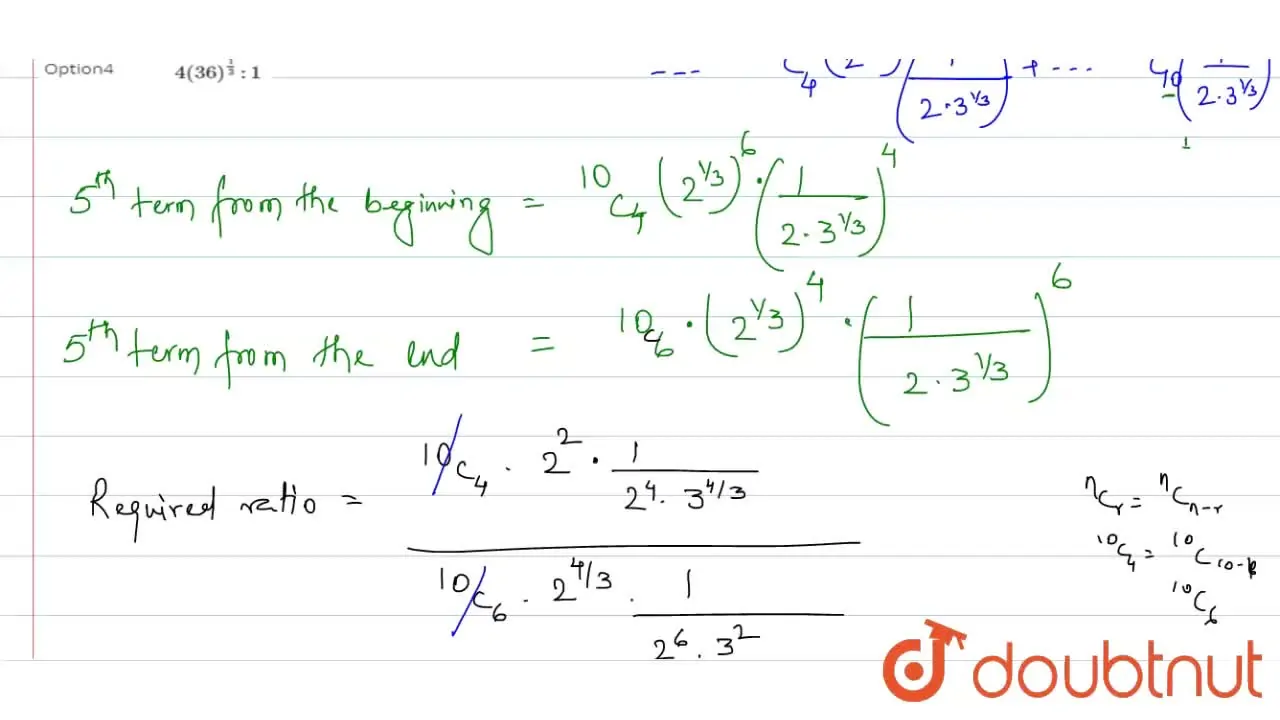Ratio of the 5th term from the beginning to the 5th term from the end in the binomial expansion of (21/3+12(3)1/3)10 is
1:2(6)13
1:4(16)13
4(36)13:1
2(36)13:1
The correct Answer is:C
Since, rth term from the end in the expansion of a binomial (x+a)n is same as the (n−r+2) th term from the beginning in the expansion of same binomial.
∴ Raquired ratio =T6T10−5+2=T5T7=T4+1T6+1
⇒T6T10−5+2=.10C4(21/3)10−4(12(3)1/3)4.10C6(21/3)10−6(12(3)1/3)6
[∵Tr+1=.nCrxn−rar]
=26/3(2(3)1/3)624/3(2(3)1/3)4 [∵.10C4=.10C6]
=26/3−4/3(2(3)1/3)6−4
=22322.323=4(6)23=436)1/3
So, the required ratio is 4(36)1/3:1
Related Playlists
- BOOK - IIT JEE PREVIOUS YEARCHAPTER - BINOMIAL THEOREMEXERCISE - Topic 1 Binomial Expansion and General Term ( Objective Questions I) (Fill in the Blanks)4videos
BINOMIAL THEOREM
- BOOK - IIT JEE PREVIOUS YEARCHAPTER - BINOMIAL THEOREMEXERCISE - Topic 1 Binomial Expansion and General Term ( Objective Questions I) (Analytical & Descriptive Questions )4videos
BINOMIAL THEOREM
- BOOK - IIT JEE PREVIOUS YEARCHAPTER - AREAEXERCISE - AREA USING INTEGRATION55videos
AREA
- BOOK - IIT JEE PREVIOUS YEARCHAPTER - CIRCLEEXERCISE - Topic 5 Integer Answer type Question1videos
CIRCLE
Similar Questions
Ratio of the 5th term from the beginning to the 5th term from the end in the binomial expansion of (21/3+12(3)1/3)10 is
View SolutionA ratio of the 5th term from the beginning and from the end in the binomial expansion of (21/3+12(3)1/3)10 is :
View SolutionIf the ratio of the 6th term from the beginning to the 6th term from the end in the expansion of (3√2+13√3)x is 16 then x=
View SolutionIf the 6th term from the beginning is equal to the 6th term from the end in the expansion of (21/5+131/5)n, then n is equal to:
View SolutionLet x be the 7th term from the beginning and y be the 7th term from the end in the expansion of (31/3+141/3)n. If y=12x then the value of n is :
View Solution(p + 2)th term from the end in the binomial expansion of (x2−2x2)2n+1 is
View SolutionFind n, if the ratio of the fifth term from the beginning to the fifth term from the end in the expansion of (4√2+14√3)n is √6:1
View SolutionFind the 4th term from the beginning and 4th term from the end in the expansion of (x+2x)9
View SolutionFind the 5 th term from the end in the expansion of (x32−2x2)9
View SolutionFind the 5th term from the end in the expansion of (x−1x)12.
View Solution


